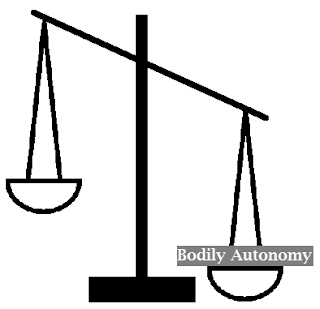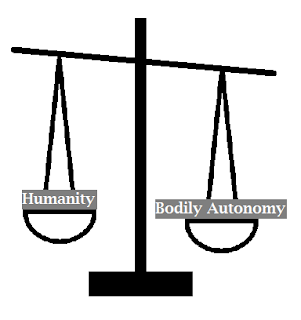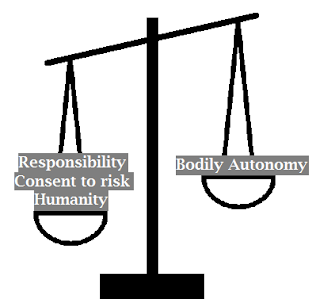The Balance
There are many important factors in the abortion debate. I try to weigh all factors in forming my perspective. I am pro-life, but I don’t pick the side lightly. It seems the only options are restricting a woman’s control over her body or allowing the unrestricted killing of human fetuses. I take both outcomes seriously; something is sacrificed no matter which side you choose, and I think a lot of people recognize that.
But not everyone. A lot of people insist the issue is black and white, that their own view is the only obvious view. I think this happens because–out of the many factors that play into abortion–people decide which factor they think is the most important…and then they refuse to consider anything else.
For example, I’ve seen pro-choicers say that whether the fetus is a person is irrelevant because no person has the right to use your body against your will. I’d depict their perspective like this:
Similarly, I’ve seen pro-lifers say that it makes no sense to grant a rape exception because the fetus is a human being no matter how he or she was conceived. I’d depict their perspective like this:





Agree 100% anyone who thinks its cut and dried doesn't understand the complexity and competing interests.
Excellent blog post.
I generally understand where you're coming from, and as you know, I believe that abortion is still immoral in the case of rape. But I think you're going after a strawman when it comes to my position (which is shared by other pro-life advocates).
For example, we don't say that the only question in abortion is whether or not the unborn is human and since it is, that makes abortion wrong and it should be illegal. What we say is that the nature of the unborn is the crucial issue because you have to determine what something is before you can determine whether or not you can kill that thing. Since we know it's human, it requires strong moral justification to kill it. And people who take this position believe that abortions in the case of rape are immoral, but do believe that abortions if the mother's life is in immediate jeopardy and the child is not yet viable to be morally justifiable.
I know you have put a lot of thought into the rape exception and have debated it extensively, and I appreciate that. I'm not sure, though, who you mean by "we" when you say "we don't say that the only question in abortion is whether or not the unborn is human and since it is, that makes abortion wrong"
I have found that actually, yes, a *lot* of people do say exactly that. I've argued about the rape exception a lot too, and there are always a few people like you who have thought a lot about the philosophy, ethics, competing interests, etc. But usually there are a lot more people that just assert that the fetus is a human being so abortion is wrong (and further assert that anyone who is for the rape exception must not think the fetus is a human being and must not really care or really be pro-life, etc.)
It's not really that surprising–I think with any issue more people stick to bumper stickers than think it out (both sides of the abortion debate as well as most other political topics). This post is mean to address the people who only give the abortion debate that kind of brief consideration. It's not meant to address the people who have factored competing interests into their position.
I see. Thank you for the clarification. When I said "we," I actually was thinking about people who have put thought into their positions, such as myself and the pro-life philosophers that I read like Frank Beckwith, Scott Klusendorf, and Christopher Kaczor, as well as some of my other friends and pro-life advocates who have taken the time to read books by those people.
"It seems the only options are restricting a woman's control over her body or allowing the unrestricted killing of human fetuses."
How would, for example, a law prohibiting coercing women into obtaining an abortion restrict a woman's control over her body? How do informed consent laws do so? Or aggressive enforcement of child support obligations? All of those policies can reduce the number of abortions but I cannot see how they restrict a woman's control over her body.
"But not everyone."
Exactly what policies are you talking about? For example, would you consider an abortion ban with a penalty that applies only to the father of the child as one that restricts a woman's control over her body? I realize that it would reduce her fornication and adultery opportunities, but it seems like a stretch to say that such laws restrict a woman's control over her body. I think the most appropriate way to stop abortion would be to go after rape, incest, prostitution, adultery, fornication, and other related crimes. Again, I fail to see how improving enforcement of rape laws would restrict a woman's right to control her body. Are you concerned about ensuring that women have the freedom to use their bodies to rape people?
"But those are very different arguments than asserting that only one factor matters at all."
Could you please explain why you think that abortion laws involve someone using your body against your will? Certainly the fetus is not using the woman's body; he or she had no part in the pregnancy. Even the types of abortion laws overturned by Roe and Casey do not require that women be pregnant because women have the right to choose not to engage in sexual intercourse. Even abortion in cases of rape do not affect that right because women have a right to not be raped. It may affect her ability to control her body, but I do not see how it affects her right to control her body. Are you thinking that a right to control a woman's body includes a right to enter into an unintended pregnancy?
"…[W]e don't require people to donate blood even if it means other people will die without blood donations. We don't do this because your bodily autonomy–your right to decide whether or not to donate blood–is
considered more important than the life of a man who will die without a blood transfusion."
I have several questions in response to this quotation.
First, how exactly do you define "the right to bodily autonomy?" You now seem to talking about the common law concept that people cannot be required to rescue someone else. Would you support laws requiring the reporting of in-process rapes? If so, then you do not support the traditional common law concept that people cannot have a duty to rescue. If you would not support such a law, then you apparently do not support the right to bodily autonomy.
Second, who is "we?" I cannot think of anyone being required to donate blood, but that might just be because enough people volunteer to give blood. I support laws that impose an obligation to act to save other people in some situations. My state has laws that go so far as to impose felonies on people who fail to act in some situations. Therefore, your term "we" must not include the people of my state.
Third, why would the right to decide whether or not to donate blood necessarily be considered more important than the life of a man who will die without a blood transfusion?
"My point is simply to say that there are a lot of factors in the
abortion debate, and while some of them weigh more than others, they all
weigh something."
I agree. However, I think it is fair to expect that people be honest about those factors. At its core, the right abortion is not about some high-falutin right to control one's body. It is about the freedom of men to engage in sexual intercourse in irresponsible ways — rape, incest, prostitution, adultery, fornication, and when either he or the woman is not ready to have a child.
That's a good point. I suppose I was reacting to the one side that wants to make most abortions illegal and the other side that fights against any restrictions on abortion. But you're right that there are measures that can reduce abortions without restricting women's control over their bodies.
"Are you concerned about ensuring that women have the freedom to use their bodies to rape people?"
I read things like this and I think "Oh, this person doesn't actually want to understand my perspective or discuss the issue, but instead ask loaded and inflammatory questions."
For the record, going forward I'll respond to your comments if I think you're sincere; if I think you're just trying to get a reaction, I won't.
"Certainly the fetus is not using the woman's body; he or she had no part in the pregnancy."
Of course the fetus is using the woman's body–not willfully, but using it all the same.
"It may affect her ability to control her body, but I do not see how it affects her right to control her body."
I don't see this as a meaningful distinction.
There are different levels of being "required to rescue," and I may support some of them, but not to the point that you're required to risk your own body or life. Does your state require people to do that?
You've talked about fornication several times now. Do you just mean sex outside of marriage, or do you mean something else?
"I read things like this and I think 'Oh, this person doesn't actually want to understand my perspective or discuss the issue, but instead ask loaded and inflammatory questions.'"
You are taking one question out of context and misrepresenting it. Here is the lead question in that set: "Exactly what policies are you talking about?" I think very few people would honestly agree that asking for clarification demonstrates that someone "…doesn't actually want to understand my perspective or discuss the issue." You have the right to refuse to answer questions for whatever reasons you want, but at least do not to make clearly false insinuations about my motives by misleading readers.
"I don't see this as a meaningful distinction."
I think this comment is very revealing and important. Rights, by their nature, override any competing interests — regardless of the strength of those competing interests.
For example, your right not to be robbed can never be overridden by the robber's interest in robbing you. If you were robbed and the robber was put on trial, the court would not consider how much he benefited from the money he stole in determining whether he should be convicted of the robbery.
Likewise, the law grants born people a right to live. The law contains no mention of balancing the freedom of killers to squeeze their trigger fingers while holding a gun that is aimed at the victim with the right to live. The right-to-life position is that, out of concerns of equity and consistency, the same right should be assigned to the unborn. As such, the right to live of the unborn should not be balanced against competing interests like the freedom to abort a pregnancy or engage in irresponsible sexual intercourse.
https://www.revisor.mn.gov/statutes/?id=609.185&year=2012
The argument of those on the other side is that the legal right to bodily integrity overrides the right to live. The right to bodily integrity, in my understanding, is a legal right in the United States that includes the right to refuse medical treatment. Because that right overrides any competing interests, no consideration is given to the interest of doctors in proceeding with medical treatment without consent.
Because rights inherently override mere interests, I think your scale diagrams make no sense in describing the position of most right-to-lifers and many on the other side.
So my question for you is: do you oppose assigning to the unborn the same right to live that is assigned to the born? If not, why not? Do you think that a right to bodily autonomy might conflict with the right to live in some situations? How?
"Does your state require people to do that?"
Apparently.
https://www.revisor.mn.gov/statutes/?id=169.09&year=2012
"You've talked about fornication several times now. Do you just mean sex outside of marriage, or do you mean something else?"
I mean the statutory definition under Minnesota law. "When any man and single woman have sexual intercourse with each other, each is guilty of fornication…"
https://www.revisor.mn.gov/statutes/?id=609.34&year=2012
Pro lifers really love human beings except for those times that they commit violence acts against abortion providers. Killing people is okay if you think that some lady isn't facing the consequences for her lascivious behavior. Just kidding, Pro-lifers are terrible people who want to force other people to live according to their vision of morality. It's not universally accepted by the country or by society. Why do you think that the fetal personhood ballot initiative failed in one of the most bible-thumping fundie Christian states in this country? Get a life, seriously. Rape-enabling idiots like you and your tea-party surrogates in congress are the reason your man Mitt Romney lost the general election.
"Rights, by their nature, override any competing interests — regardless of the strength of those competing interests."
I don't believe this is true. If the "competing interests" are also rights, then there's a complex situation–a conflict. Your examples list one right against a competing interest that *isn't* a right–no one has the right to rob people, or squeeze triggers or have sex under any and all circumstances. But people do have the right to say they don't want their bodies used by other people.
I think the unborn should have the right to live, yes. I just also think bodily rights are an important consideration. I already listed blood donations as an example.
I don't believe sex outside of marriage is inherently immoral, I certainly don't believe it should be illegal, and even if I did, I don't believe there's any chance at all that we would get enough national consensus behind such an idea to make it even a significant social pressure, much less a legal one.
"I don't believe this is true. If the 'competing interests' are also rights, then there's a complex situation–a conflict."
But you stated that you did not see the distinction between rights and abilities "…as a meaningful distinction." Are you changing your mind?a
"…[P]eople do have the right to say they don't want their bodies used by other people."
What is your source or justification for this assertion?
"I don't believe sex outside of marriage is inherently immoral…"
I am glad you brought that up. I agree that it is not inherently immoral, but enforcing such laws would help separate out the harmful from the unharmful because men and women in responsible sexual relationships would just get married — leaving the harmful sexual relationships to be targeted by the enforcement.a
"…I certainly don't believe it should be illegal…"
Then how can you claim to be pro-life? Illicit sexual relationships and other crimes undergird the vast majority of abortions. If a man marries the women he impregnates and fully supports and protects both the mothers and children, the chances of his progeny being aborted are remote.
"…I don't believe there's any chance at all that we would get enough
national consensus behind such an idea to make it even a significant
social pressure, much less a legal one."
I must admit that I have not had much success so far. But the pro-life movement is not having much success with its current strategies. If other pro-lifers joined with me we might be able to get some rural prosecutor in Minnesota to start enforcing the adultery and fornication statutes. Once people saw how well it worked, I think it could gain wider support.
Most pro-lifers condemn violence against abortion providers. In fact, your side is the one responsible for 50 million or so deaths since 1973.
Actually, you're forcing your morality on others as well by supporting laws against infanticide, child support evasion, theft, rape, postnatal killing, child abuse, domestic violence, et cetera. You're guilty of the argumentum ad populum fallacy, since the opinion of the people on a particular issue does not make the issue any more or less morally justifiable. The fetal personhood initiative in Mississippi failed to due pro-choice propaganda, poor strategy, and some other things. Keep in mind that gay marriage lost 32 or so consecutive popular referenda before it finally won some referendums this year.
Who here supports rape? Also, Romney lost in large part due to his own flaws, such as the massive flip-flopping, not releasing his tax returns, and being so rich and fake that he was unable to genuinely connect with many ordinary Americans and their daily struggles.
I think that consensual incest, prostitution, adultery, forcination, and those things are not comparable to rape and those things should be legal.
Actually, people do usually have the right to squeeze their fingers, just not when a gun is in their hands and pointed towards someone else's head.
Maybe I'm missing something, but are you politically pro-choice, Laura?
""Are you concerned about ensuring that women have the freedom to use their bodies to rape people?""
That is what she was responding to. And no context makes this question reasonable. Your context certainly doesn't.
Stop playing dumb. "Oh, me? Ask something loaded? Never. I only implied you believe in a 'freedom to rape'." Either you are stupid enough to believe that *anyone* here supports a freedom to rape, or you don't and you're being a troll. This is why you get downvoted, this is why no one takes you seriously, this is why you fail.
Oh, and of course you still fail miserably at hitting a very simple "reply" button, and at keeping up with conversations you start (people respond to you, for some silly reason, but you don't reply again, yet you'll post on new blog posts). You lack integrity and commitment. You hit and run. It's pathetic.
I'm curious why you're curious. Does taking bodily rights seriously defy a pro-life stance? Does supporting laws that prohibit coercion defy a pro-life stance? Or are you just curious because not many pro-lifers take said stance?